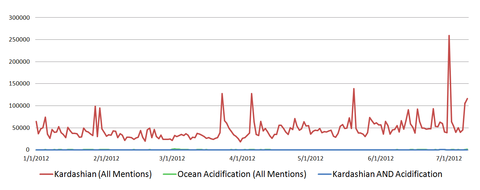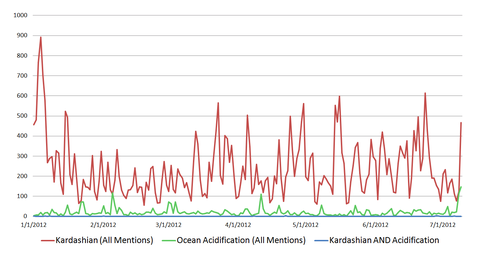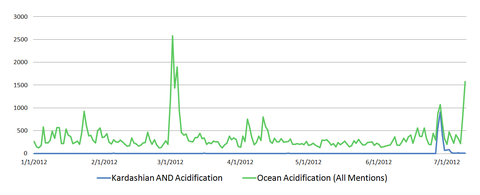Ocean Acidification vs. The Kardashians, Part Deux: The Gulf Is Even Wider Online
Recently, an analysis by Media Matters bemoaned the fact that print and broadcast media devoted approximately 40 times as much news coverage to the Kardashians as to ocean acidification. This was despite, and perhaps because of, the latter’s established importance—and, one is left to infer, the former’s non-importance (taking a leap of faith here that you’re on the same page as us on this one).
Media Matters’ study didn’t look at online mentions, so we did. And what we found was surprising.
Tweeting Up With The Kardashians
While the purpose of the study was evidently to hold media outlets accountable for their insubstantial coverage, looking at the relevant online mentions of the two subjects suggests that those media outlets are actually relative models of discretion, decorum and depth.

Total online mentions from January 1 - July 9, 2012 for Upwell's ocean acidification keyword set (green) and our Kardashians keyword set (red).
Between January 1 and July 9, the Kardashians received 9.6 million total mentions. In contrast, ocean acidification received 70,333 total mentions. That’s 136 times more mentions for Kim and her sisters than a declining pH. (Imagine that!)
Does this actually mean anything? Comparing Kardashians and ocean acidification isn’t so much comparing apples and oranges as it is comparing apples and the Holy Hand Grenade of Antioch. But it is a strong illustration of the challenges in breaking through the online noise, and the reality of the relative size of the ocean bubble, as well as the power of celebrity.
Of course, this is looking at total online mentions. That means every publicly posted tweet, Facebook post, blog post, forum post, news article or YouTube video. Given such a large cross-section of the Internet using populace, perhaps a weakness for the sensational should not come as a surprise. What about online news media?
A Model of (Relative) Restraint

Online mentions (news media only) from January 1 - July 9, 2012 for Upwell's ocean acidification keyword set (green) and our Kardashians keyword set (red).
Narrowing our search to news media online (and omitting such sources as Twitter and Facebook) reveals perhaps some cause for hope.
Unlike print and television coverage, which, according to Media Matters, favored the Kardashians some 40 times more than ocean acidification, online the fabled family only receives 12 times greater coverage. (45,305 Kardashian mentions vs. 3,813 mentions of ocean acidification between January 1st and July 9th, 2012.)
So while online audiences overwhelmingly love talking—and tweeting—about celebrities, it appears that the online news media is less sensational than their traditional cousins. Or at least when it comes to the Kardashians.
The Kardashians — An Unwitting Force For Good In The Ocean?

Online mentions from January 1 - July 9th, 2012 for Upwell's ocean acidification keyword set (green) and the intersection of the Kardashian set and the ocean acidification set (blue)
Celebrity power can also be useful for attention campaigners. On June 27th, when Media Matters released the Kardashian study, the news received over 1,000 mentions in a single day. For smaller topics, still struggling to gain their share of online attention, such spikes are critical, helping to broaden the issue's exposure beyond small, often siloed groups of experts, activists and other stakeholders.
In the case of ocean acidification, a topic that normally receives about 261 mentions per day, a fourfold increase in attention is huge. In fact, the Kardashian study created the third largest spike in the ocean acidification conversation all year. (The largest was a March 2nd article by Wired Science, Ocean Acidification to Hit 300-Million-Year Max, the second-largest is the AP story on the ICRS we reported on yesterday.)
The Kardashians weren't involved in Media Matters' study. They weren't recruited as spokespeople for a series of ocean acidification PSA's. They were simply used as a point of comparison to make a general point about contemporary news coverage. And yet, despite that wholly arbitrary comparison, the mere inclusion of the Kardashian name still resulted in one of the largest increases in ocean acidification mentions this year.
Of course, not every mention results in a new ocean acidification activist. But when a better understanding of an unfamiliar term is only a Google search away, increasing online mentions in an important rung on that ladder. And celebrity remains a potent tool for generating such attention.
Even unwittingly.
Add a comment